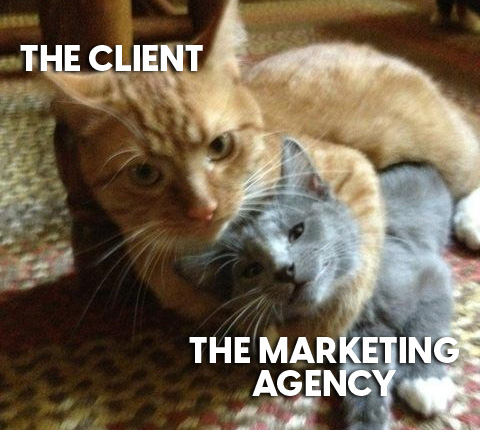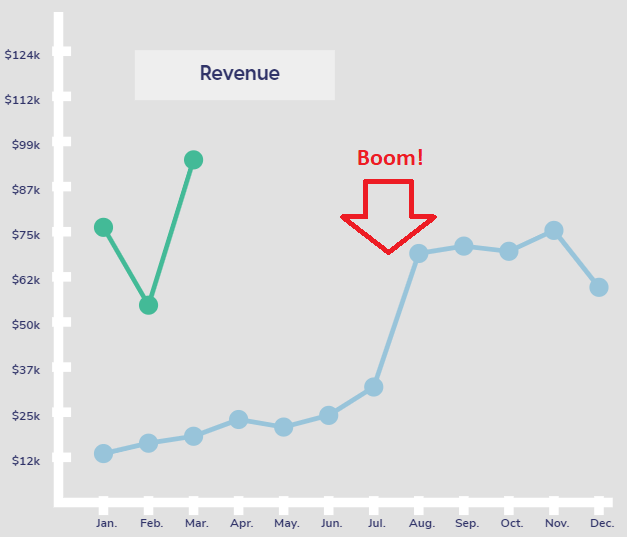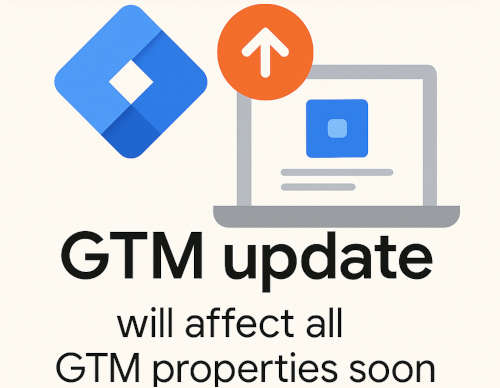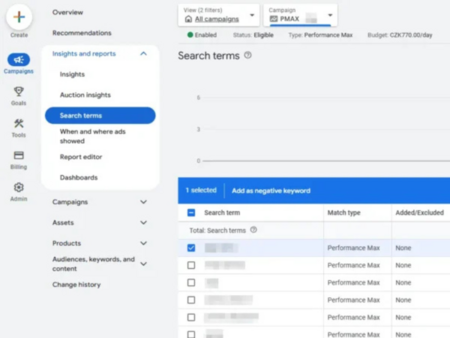Whether you’re looking to hire an advertising agency or you’re having trouble managing your existing one, you don’t want to be stuck in a scenario where you’ve got two “sides” finger-pointing as the ship burns. Sadly, this occurrence happens far too often in the marketing world because of how difficult it can be to match various personalities together. That’s why I’m so unbelievably proud that we retain our clients an average of 3.5 years. That’s freaking hard.
But wait, why listen to a digital marketing agency about how you should manage us better? We’re probably so biased!
Previously to creating a marketing agency, I worked in-house at a company managing another agency. It was that terrible experience that drove me to create Digital Position. Since then, I’ve managed and overseen hundreds of client relationships. I understand why they succeed, why they fail, and what both the client and the agency can do better.
That’s right, it’s not just “the client’s fault”. It’s all about fit before the engagement even starts.
What Type of Manager Are You?
The first question to ask yourself is “what is my management style”? Think about how you manage your employees and be completely honest with yourself. I’ve said many times that ego is the #1 killer of most businesses, but don’t worry I’m not judging you. This is an open, safe place 😉.
Let’s ask yourself some questions:
- Do you want to be completely hands off?
- Do you want to avoid any other costs at all that might come up?
- Are you fearful of wasting money on the agency and getting nothing in return?
- Are you fearful that the agency might not care about your results like you would?
- Do you think you can do what the agency does / that it’s not that hard?
- Are you expecting constant communication?
I’m a firm believer that proper management is balanced management, but that doesn’t mean you can’t be successful with other styles of management – you just need the right fit.
Take this little image I like to call the “management spectrum”:

The “ends” of the spectrum are the danger zone and are colored red on purpose. Think of this spectrum as an “odds of success” meter for your digital marketing relationship. You can absolutely be successful in the “danger zone”, but your odds of success go down significantly.
Agency Relationship with a Hands-off Manager

Hands-off managers can be fantastic for success IF they are responsive and support the agency with what they need to be successful. In fact, if you’ve got an amazing agency who is proactively pushing growth (that’s a BIG IF) and a growth relationship where the agency grows with you, these can be the absolute ideal situation for both parties.
Think about it from an employee > manager perspective internally. You come up with a process to improve something in your business, use it all for yourself, don’t take the time to train your staff, then blame them if results are bad or they aren’t providing value. How terrible is that? Management can be light touch, but you can’t just abandon your team and then blame them if the results aren’t great, right?
If you find yourself in the “tell me what to do” mode and you want to be hands-off, that’s perfectly okay though! Maybe you have business challenges outside of marketing you need to focus on or other great reasons why this is the case. If so, make sure you read the “tips” section here.
PROS:
- The agency can be the expert you’re paying them to be and drive the strategy.
- The agency has more time to spend in the account and isn’t dragged down by constant communication.
- You’re starting a healthy relationship built on your trust in the agency.
CONS:
- Bad agencies can abuse this and put little effort into your campaigns. (I should probably say “will”. ~75% of the accounts we audit for new business are horrible).
- You have a lot of value to add that you might not realize. You should know your business better than anyone, so if you’re too “hands-off” the agency might not realize that value and leverage it in their efforts.
TIPS
- If the agency needs something from you, don’t “ghost” them. It’s okay to be “hands-off”, but not completely unresponsive. If you’re doing this to your agency, you’re setting them up for failure.
- Be willing to invest more if you don’t have the bandwidth to provide support. For example, if we have a client that’s hands-off and we need them to make a change on their website – it’s perfectly fine if they say “no”, but only IF they’re willing to let us bring in agency partners or additional resources to get that problem fixed.
- If you don’t have the time, be willing to pay your agency to fix problems that are beyond their contract with you.
Agency Relationship with a Balanced Manager

Balanced management typically follows a process. A weekly or monthly call, a weekly or monthly report, and then primarily hands-off beyond that. You just want what’s best for the business; identify you have value to bring to the relationship, but also identify that you’re paying experts to pull the digital marketing levers and trust them to do a great job.
This is typically the ideal relationship so long as both sides are in alignment on the strategy. The cadence of meetings allows:
- the agency to plan their schedule & bandwidth
- the teams to iron out any kinks that come up before they become huge problems
- a place to debate ideas
- gives some room for them to breathe and execute the strategy
If you think you’re a balanced manager, check out the pros/cons/tips below:
PROS
- The agency gets valuable business knowledge from you
- You’re informed of the strategy and can provide insight if needed
- The agency can typically get responses and assistance from you if needed
CONS
- Multiple chefs in the kitchen can become a problem, although MUCH lower risk than micromanagement
- Sometimes people are “micromanagers in disguise” in this bucket, they are fine with a weekly/monthly cadence but they require a 1,000 word novel from the agency every week explaining every detail.
TIPS
- Focus your feedback and insights on what you can do to help the agency succeed, not nitpicking the account(s)
- If meetings result in the agency asking for help, be willing to provide it quickly
- Keep your eyes focused on the forest, not the weeds.
Agency Relationship with a Micromanager

I’ll be completely honest, micromanagers are some of the most toxic professional workers I’ve come across. The only way I’ve ever seen micromanagement be successful for anyone is if you find yourself a bunch of “yes people” as an agency. The kicker is, those people are typically very bad at digital marketing, and thus, you’ll be frustrated anyway.
If you’re being honest with yourself, and you’re in this bucket, typically the root issues are:
- Ego – you think you know more than the people you’re managing
- Mistrust – you don’t trust the people you’re managing
- Fear – you’re so fearful of failure that you want your hand in every aspect
If any of these buckets define you, I would strongly consider you to think differently. That is, unless the marketing agency has proven to neglect you or provide terrible results despite your best support – then fire them. Let me tell you a quick story.
Once, we had a client who brought in a new marketing manager. The new marketing manager was arguably the worst micromanager I’ve personally come across. He wanted to message us constantly, if we didn’t respond within 1 hour (no lie) complaints would come flowing in, he made egotistical statements about his past experience constantly, he bragged about how important he should be because of how much they were paying us – and so much more. At one point we even logged our average response time of 23 minutes (which is insane even for an in-house employee!) just to see if we were in the wrong.
We were using a Target CPA bidding strategy and this person thought manual CPC would be better. We explained why that wasn’t the case for them, backed everything up through irrefutable data, but were forced to execute the strategy this person wanted anyway.
It completely bombed the account. Then the marketing manager continued to push for it!
Throughout this time, we gave this marketing manager “5 things” we needed from them to crush their growth goals. This included some changes to the landing pages, some access to reliable back-end data, etc. – nothing outside the realm of possibility.
The marketing manager instead insisted on their own ideal account management changes, ignored our requests, routinely jumped in the account to make changes, any pushback we had was ignored, gave us completely irresponsible deadlines (“I need you to make the following changes, all by EOD” – and would message us at 1PM).
I’ll say it again – ego is the #1 killer of businesses. Would you want to work with this person?
It all goes without saying, but leadership was frustrated and this marketing manager blamed us (we tried 5 different account leads!). In 8 years, there have only been 2 relationships we’ve walked away from and this was one of them.
Almost no micromanager thinks they’re a micromanager. That’s what makes this problem so difficult. If you think you might fall into this bucket, there’s no “pros/cons” list here – they’re all cons. Very few great employees will want to work for you, agency or in-house. Results will be bad. All I can do here is make my best plea to avoid this at all costs.
I like to tell prospective employees that “I hire adults”. Adults don’t need to be hand-held; you open the door and provide the necessary training and they’ll walk through it. That doesn’t mean they won’t trip from time to time, but this is crucial for their growth and your success!
#rantover
Now that you know what kind of manager you are (or want to be), why don’t you take a moment to get in touch! There’s no smarter move than getting professionals involved!
Agency Management Checklist
Now that we’ve got the personality part out of the way because it’s the most important, let’s take a look at my top 5 tips to manage your digital marketing agency and skyrocket your odds of success!
1.) Set Clear, Reasonable Goals
Goals are super important and are typically unique for each company so coming up with goals together with your agency is key. The agency might have some really good perspective here!
Once, we had a client who was struggling with growth. They were selling tile, which has a very long time to purchase (often 90+ days). We were managing to the Google Ads ROAS, but it was missing so much attribution for our efforts. I jumped on a 30 minute phone call, asked for us to manage to the overall Shopify ROAS, and then months later they were driving 3x the revenue and couldn’t believe the profit they were driving. One little conversation, a little flexibility, and boom.
Another client we worked on goals together in year 1, we set goals at 60% growth. We delivered over 100% growth. Then in year 2, because of the success of year 1, they arbitrarily handed us goals at 200% growth. We delivered another triple-digit year of 120% growth, and leadership was upset that we weren’t hitting our goals. Don’t be this client, that’s crazy!
Get your agency (us) involved. We’ll provide open, honest feedback and help you set aggressive goals for your business. Our portfolio overall grew 178% in PPC revenue and 105% in SEO revenue YoY in the last 12 months, that doesn’t happen because we’re sitting on our hands!
2.) Get Proper Tracking in Place
You can’t improve what you don’t measure. If your tracking is messed up, attribution is still on last click, or the agency has a tough time tracking results – let’s get this fixed. Let the agency bring in a partner or hire an analytics agency that can get this cleaned up. It’s often one of the most undervalued aspects of digital marketing.
3.) Be Flexible
Our motto is “fail fast & cheap”. Digital Position, for how exciting our results are compared to our competitors, doesn’t succeed 100% of the time. Most of the time we need to continuously test and some of those tests fail. But with every test we learn, and with every test your account improves. Once we’ve “cracked the nut” for you, the sky is the limit. Here’s an example of client who was growing slowly for 4-5 months, and then BOOM:

See that big spike in August 2020? This was when we found the “strategy that worked” and the business took off.
4.) Be There For Your Agency
If you’ve hired experts who live and breathe digital marketing every day, to do your digital marketing, and they’re saying “we need XYZ from you”, your ears should perk up. Every good partnership starts with a foundation of trust, any thing we ask of our clients is because we need it to drive the best results. It might be tweaks to your landing pages, it might be asking for better tracking, it might be to fix bad reviews and improve customer service – it could be anything.
Take this feedback as a sign that your agency is going above and beyond to leave no stone unturned to grow your business, NOT as an attack against you or your business.
5.) Consistent Communication Expectations
I highly encourage clients to set up a regular cadence for meetings. Monthly typically works best for Digital Position, but weekly works too. Use this as a medium to get your feedback out, provide value to the agency, and feel comfortable with the strategy the agency is utilizing. No question is off limits, on a regular basis there should be fully transparent phone calls.
Have the agency provide an agenda. This ensures the agency is always thinking about ideas and proactively coming up with things to discuss to move your business forward!
We also provide on the first business day of the month a report with 3 sections – the metrics (our interpretation), projects completed last month, and upcoming projects. We’ve found this to be amazing! Clients have full faith in what we’re doing behind the scenes.
TL:DR
- Figure out what type of personality you are, match yourself up with a good fit
- Hands-off > Super proactive agency (like us 😉)
- Balanced > Balanced agency (also us)
- Micromanager > “Yes sir/ma’am” agency (or change your behavior)
- Set clear, reasonable goals
- Get proper tracking in place
- Be flexible
- Be there for your agency
- Establish consistent communication expectations
The hardest part about working with an agency is finding one that fits with what you’re trying to achieve. If you’re looking for a PPC agency or SEO agency that pushes for aggressive growth, shoot us a proposal and we’ll scale your business together!





no replies